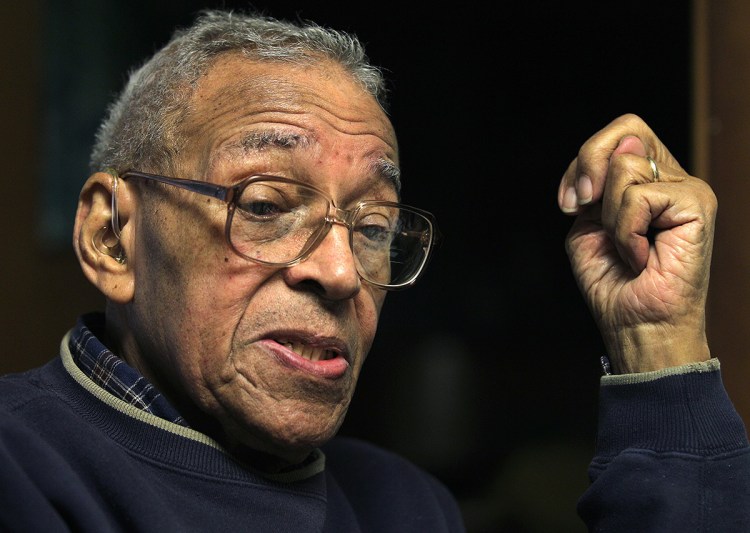A Portland native who belonged to a groundbreaking World War II fighter squadron that helped lead the way toward desegregation of the U.S. military has died.
Eugene B. Jackson, 92, of North Marshfield, Massachusetts, died Sept. 20, according to his close friend and attorney, Paul Kaufman.
Jackson, who was born in Portland and graduated from Portland High School in 1941, served with the Tuskegee Air Squadron during World War II.
Jackson, who maintained the radio and communication equipment on the aircraft flown by the African-American pilots, received the Congressional Gold Medal in 2007 along with other Tuskegee Airmen.
Though he spent most of his adult years in Massachusetts, he made frequent visits to Maine in the decades that followed, staying in close contact with his Portland-area friends.
Kaufman, who knew Jackson for more than 40 years, said Jackson liked to tell him a story about his experiences at Portland High.
“He liked to tell me that he didn’t know he was a black person when he lived in Portland. It wasn’t until he entered the Army that he realized it,” Kaufman said. “He’d say that in Portland you were either a good person or a bad person, not a black person.”
Kaufman said Jackson was raised by his grandparents and had some Native American blood in him – he could trace his roots back to the Micmac tribe.
In 1942, Jackson joined the Army Air Force. He was sent to Fort Devens in Massachusetts, where recruits were separated by race.
Years later, he recalled what that felt like.
“I was from the oldest black family in the state of Maine,” Jackson told a reporter for a newspaper called Wicked Local in November 2012 during the town of Marshfield’s Eugene Jackson Day celebration. “I was also one of 357 students in (elementary) school and the only one who was black. But it didn’t matter. I lived my life and had a very pleasant experience growing up.”
Jackson said it wasn’t until he joined the Army in World War II that he was exposed to discrimination and intolerance.
“When I arrived in Tuskegee, Alabama, I learned about injustice and bigotry. I was spat upon, called names and treated so differently. It opened my eyes in many ways to a whole new world I had not known before,” he said.
During the war, Jackson’s fighter squadron was stationed in Italy and North Africa, Kaufman said. Though Jackson didn’t fly the airplanes, “he knew the names of all the pilots,” Kaufman said.
While in Italy, he and other Tuskegee Airmen were blessed by Pope Pius XII during a visit to the Vatican.
Sometime after the war ended, Jackson moved to Massachusetts. He lived in a house on Oak Street in North Marshfield for more than 50 years.
He met his future wife while they were students at Boston University. He was an engineering graduate and made pulmonary and respiratory equipment. His wife, Constance (Cordice) Jackson, was “the love of his life,” Kaufman said. She died in 2006.
The couple traveled to countries across the globe, living in villages, attending classes at local universities, and even learning other languages, including Spanish, Kaufman recalled. “They would immerse themselves in a country’s culture,” he said.
Jackson never lost touch with his friends in Maine. “He always came back to Maine,” said a longtime friend, Mildred Richardson of Portland. “He was just like family to me.”
Richardson said she called Jackson by his nickname, Sonny, but has no idea where that came from. He grew up on Valley Street in Portland.
Jackson was a close acquaintance of Harolddeane Snell’s father and family.
“We all knew him as Uncle Sonny,” said Snell, who lives in California.
Snell, a Portland High graduate, still has a copy of the 1941 yearbook, which says Jackson served as the track team’s manager and had a “penchant” for eating. His ambition was to become a machinist.
Snell said Jackson’s ancestors moved to Portland in the late 18th century. She said he had an intense interest in the city’s history, in particular the Abyssinian Meeting House, which was built on Munjoy Hill by African-Americans. The building, which is listed on the National Register of Historic Places, is the only Underground Railroad site in Maine recognized by the National Park Service.
Kaufman said his friend will be missed by many people.
“To me it was a great honor to know him because he was such a Renaissance man,” Kaufman said. “He even wrote poetry.”
A funeral Mass will be celebrated at noon Thursday at the Trinity Episcopal Church in Marshfield.
Send questions/comments to the editors.



